1997 TOYOTA 4RUNNER engine
[x] Cancel search: enginePage 150 of 223
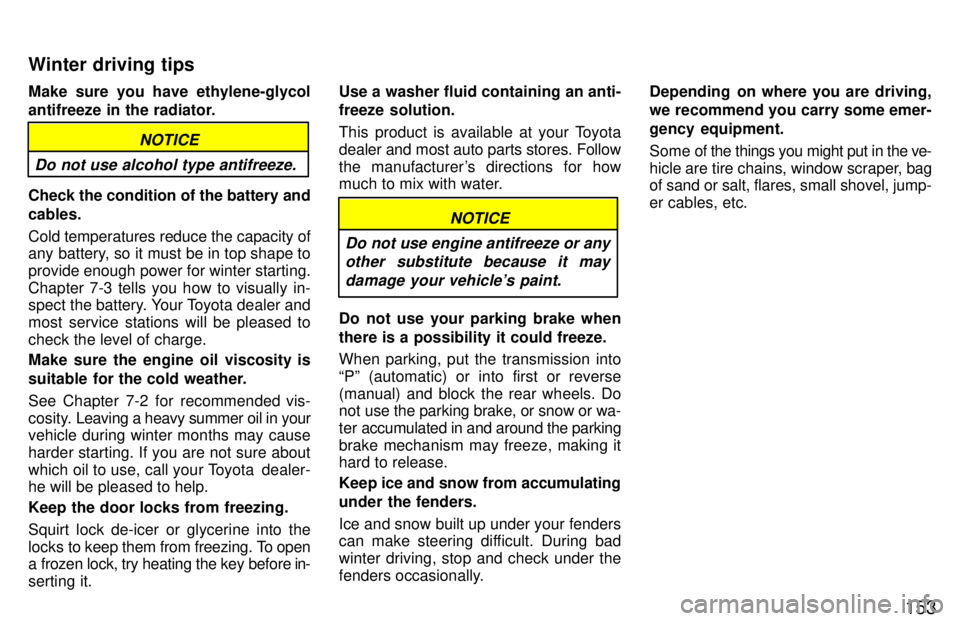
153
Make sure you have ethylene-glycol
antifreeze in the radiator.
Do not use alcohol type antifreeze.
NOTICE
Check the condition of the battery and cables. Cold temperatures reduce the capacity of
any battery, so it must be in top shape to provide enough power for winter starting.Chapter 7-3 tells you how to visually in-
spect the battery. Your Toyota dealer and
most service stations will be pleased tocheck the level of charge.
Make sure the engine oil viscosity is
suitable for the cold weather.
See Chapter 7-2 for recommended vis-
cosity.
Leaving a heavy summer oil in your
vehicle during winter months may cause
harder starting. If you are not sure about
which oil to use, call your Toyota dealer- he will be pleased to help. Keep the door locks from freezing. Squirt lock de-icer or glycerine into the
locks to keep them from freezing. To open
a frozen lock, try heating the key before in-serting it. Use a washer fluid containing an anti-
freeze solution.
This product is available at your Toyota
dealer and most auto parts stores. Follow
the manufacturer's directions for how
much to mix with water.
Do not use engine antifreeze or any
other substitute because it may
damage your vehicle's paint.
NOTICE
Do not use your parking brake when there is a possibility it could freeze. When parking, put the transmission into
Pº (automatic) or into first or reverse
(manual) and block the rear wheels. Do
not use the parking brake, or snow or wa-
ter accumulated in and around the parkingbrake mechanism may freeze, making it
hard to release. Keep ice and snow from accumulating
under the fenders.
Ice and snow built up under your fenders
can make steering difficult. During bad winter driving, stop and check under the
fenders occasionally. Depending on where you are driving,
we recommend you carry some emer- gency equipment.
Some of
the things you might put in the ve-
hicle are tire chains, window scraper, bag of sand or salt, flares, small shovel, jump- er cables, etc.
Winter driving tips
Page 151 of 223
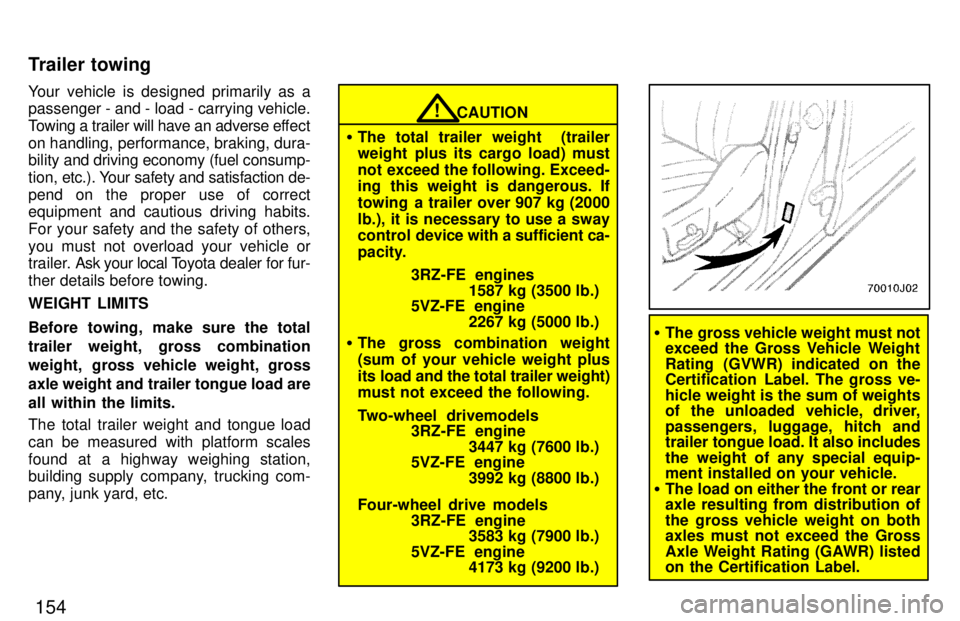
154
Your vehicle is designed primarily as a
passenger - and - load - carrying vehicle.
Towing a trailer will have an adverse ef
fect
on handling, performance, braking, dura-
bility and driving economy (fuel consump-
tion, etc.). Your safety and satisfaction de-
pend on the proper use of correct
equipment and cautious driving habits.
For your safety and the safety of others,you must not overload your vehicle or
trailer. Ask your local T oyota dealer for fur-
ther details before towing. WEIGHT LIMITS
Before towing, make sure the total
trailer weight, gross combination
weight, gross vehicle weight, grossaxle weight and trailer tongue load are
all within the limits.
The total trailer weight and tongue load
can be measured with platform scales
found at a highway weighing station,
building supply company, trucking com-
pany, junk yard, etc.
CAUTION!
� The total trailer weight (trailer
weight plus its cargo load) must
not exceed the following. Exceed-
ing this weight is dangerous. If
towing a trailer over 907 kg (2000lb.), it is necessary to use a sway
control device with a sufficient ca-
pacity.
3RZ-FE engines 1587 kg (3500 lb.)
5VZ-FE engine
2267 kg (5000 lb.)
� The gross combination weight
(sum of your vehicle weight plus
its load and the total trailer weight)
must not exceed the following.
Two-wheel drivemodels
3RZ-FE engine
3447 kg (7600 lb.)
5VZ-FE engine
3992 kg (8800 lb.)
Four-wheel drive models 3RZ-FE engine 3583 kg (7900 lb.)
5VZ-FE engine 4173 kg (9200 lb.)
�The gross vehicle weight must not
exceed the Gross Vehicle Weight
Rating (GVWR) indicated on the
Certification Label. The gross ve-
hicle weight is the sum of weights
of the unloaded vehicle, driver,
passengers, luggage, hitch and
trailer tongue load. It also includes
the weight of any special equip-
ment installed on your vehicle.
� The load on either the front or rearaxle resulting from distribution of
the gross vehicle weight on both axles must not exceed the Gross
Axle Weight Rating (GAWR) listed on the Certification Label.
Trailer towing
Page 152 of 223
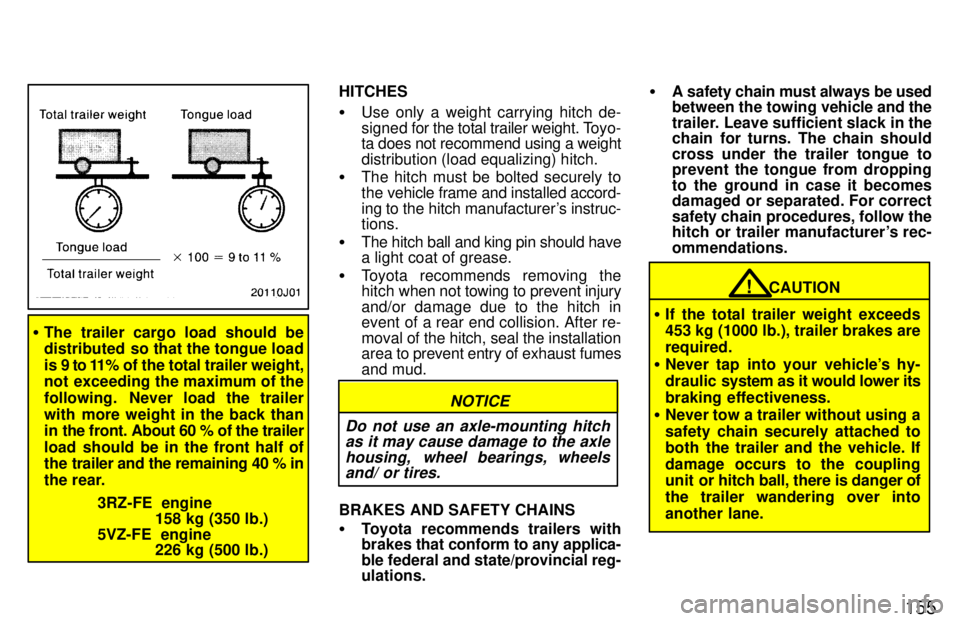
155
�The trailer cargo load should be
distributed so that the tongue load
is 9 to 11% of the total trailer weight,
not exceeding the maximum of the
following. Never load the trailer
with more weight in the back than
in the front. About 60 % of the trailer
load should be in the front half of
the trailer and the remaining 40 % in
the rear.
3RZ-FE engine 158 kg (350 lb.)
5VZ-FE engine 226 kg (500 lb.) HITCHES �
Use only a weight carrying hitch de-
signed for the total trailer weight. Toyo-
ta does not recommend using a weight
distribution (load equalizing) hitch.
� The hitch must be bolted securely to
the vehicle frame and installed accord-
ing to the hitch manufacturer's instruc- tions.
� The hitch ball and king pin should havea light coat of grease.
� Toyota recommends removing thehitch when not towing to prevent injury
and/or damage due to the hitch in
event of a rear end collision. After re- moval of the hitch, seal the installation
area to prevent entry of exhaust fumes
and mud.
Do not use an axle-mounting hitch as it may cause damage to the axle
housing, wheel bearings, wheelsand/ or tires.
NOTICE
BRAKES AND SAFETY CHAINS � Toyota recommends trailers with
brakes that conform to any applica-
ble federal and state/provincial reg-ulations. �
A safety chain must always be used
between the towing vehicle and the
trailer. Leave sufficient slack in the
chain for turns. The chain should cross under the trailer tongue to
prevent the tongue from dropping
to the ground in case it becomes
damaged or separated. For correct
safety chain procedures, follow the
hitch or trailer manufacturer's rec- ommendations.
CAUTION!
� If the total trailer weight exceeds
453 kg (1000 lb.), trailer brakes are required.
� Never tap into your vehicle's hy-
draulic system as it would lower its
braking effectiveness.
� Never tow a trailer without using a
safety chain securely attached to
both the trailer and the vehicle. If
damage occurs to the coupling
unit or hitch ball, there is danger of
the trailer wandering over into
another lane.
Page 153 of 223

156
TIRES �
Ensure that your vehicle's tires are
properly inflated. See Chapter 7-2 forinstructions.
� The trailer tires should be inflated to
the pressure recommended by the
trailer manufacturer in respect to the
total trailer weight.
TRAILER LIGHTS � Trailer lights must comply with federal,
state/provincial and local regulations. See your local recreational vehicle
dealer or rental agency for the correct type of wiring and relays for your trail-
er. Check for correct operation of the
turn signals and stop lights each time
you hitch up. Direct splicing may dam-
age your vehicle's electrical system
and cause a malfunction of your lights.
BREAK-IN SCHEDULE � Toyota recommends that you do not
tow a trailer with a new vehicle or a ve-
hicle with any new power train compo-
nent (engine, transmission, differen- tial, wheel bearing, etc.) for the first
800 km (500 miles) of driving. MAINTENANCE �
If you tow a trailer, your vehicle will re-
quire more frequent maintenance due
to the additional load. For this informa-
tion, please refer to the scheduled
maintenance information in the Own-
er 's Manual Supplement/Maintenance Scheduleº.
� Retighten all fixing bolts of the towing
ball and bracket after approximately
1000 km (600 miles) of trailer driving.
PRE-T OWING SAFETY CHECK � Check that your vehicle remains level
when a loaded or unloaded trailer is
hitched. Do not drive if the vehicle has
an abnormal nose-up or nose-down
condition, and check for improper
tongue load, overload, worn suspen-
sion or other possible causes.
� Make sure the trailer cargo is securely
loaded so that it cannot shift.
� Check that your rear view mirrors con-
form to any applicable federal, state/
provincial or local regulation. If not,
install the rear view mirrors required
for towing purpose. TRAILER TOWING TIPS
When towing a trailer, your vehicle will
handle differently than when not tow-
ing.
The three main causes of vehicle-
trailer accidents are driver error, ex-
cessive speed and improper trailer
loading. Keep these in mind when tow-
ing: � Before starting out, check operation of
the lights and all vehicle-trailer con-
nections. After driving a short dis-
tance, stop and recheck the lights and
connections. Before actually towing a
trailer, practice turning, stopping and
backing with a trailer in an area away
from traffic until you learn the feel.
� Backing w ith a trailer is difficult and re-
quires practice. Grip the bottom of thesteering wheel and move your hand to
the left to move the trailer to the left. Move your hand to the right to move
the trailer to the right. (This procedure is generally opposite to that when
backing without a trailer). Also, just
turn the steering wheel a little at a time,
avoiding sharp or prolonged turning. Have someone guide you when back-
ing to reduce the risk of an accident.
Page 154 of 223

157
�
Because stopping distance may be in-
creased, vehicle-to-vehicle distance
should be increased when towing a
trailer. For each 16 km/h (10 mph) of speed, allow at least one vehicle and
trailer length between you and the ve-
hicle ahead. Avoid sudden braking as you may skid, resulting in jackknifing
and loss of control. This is especially
true on wet or slippery surfaces.
� Avoid jerky starts or sudden accelera-tion. If your vehicle has manual trans-
mission, prevent excessive clutch slip-
page by keeping engine rpm low and
not racing the engine. Always start out
in first gear.
� Avoid jerky steering and sharp turns.
The trailer could hit your vehicle in a
tight turn. Slow down before making a
turn to avoid the necessity of sudden braking.
� Remember that when making a turn, the trailer wheels will be closer than the vehicle wheels to the inside of the
turn. Therefore, compensate for this
by making a larger than normal turning
radius with your vehicle. �
Crosswinds and rough roads will ad-
versely affect handling of your vehicle
and trailer, causing sway. Pay atten-
tion to the rear from time to time to pre-
pare yourself for being passed by largetrucks or buses, which may cause your
vehicle and trailer to sway. If swaying
happens, firmly grip the steering wheel
and reduce speed immediately but
gradually. Never increase speed.
Steer straight ahead. If you make no
extreme correction with the steering or
brakes, the vehicle and trailer will sta-bilize.
� Be careful when passing other ve-hicles. Passing requires considerable
distance. After passing a vehicle, do
not forget the length of your trailer and
be sure you have plenty of room be-
fore changing lanes.
� In order to maintain engine braking ef-
ficiency, do not use fifth gear (manual
transmission) or overdrive (automatic transmission). �
Because of the added load of the trail-
er, your vehicle's engine may overheat
on hot days (at temperatures over 30 5C [85 5F]) when going up a long or
steep grade with a trailer. If the engine
coolant temperature gauge indicates
overheating, immediately turn off the
air conditioning (if in use), pull off the
road and stop in a safe spot. Refer to
If your vehicle overheatsº in Part 4 of this manual.
� Always place wheel blocks under both
the vehicle and trailer wheels whenparking. Apply the parking brake firm-
ly. Put the transmission in Pº (auto-
matic) or in first or reverse (manual).
Avoid parking on a slope with a trailer,but if it cannot be avoided, do so only after performing the following:
1. Apply the brakes and hold.
2. Have someone place wheel blocks un-
der both the vehicle and trailer wheels.
3. When the wheel blocks are in place, release your brakes slowly until the blocks absorb the load.
4. Apply the parking brake firmly.
5. Shift into first or reverse (manual) or Pº (automatic) and turn off the engine.
Page 155 of 223
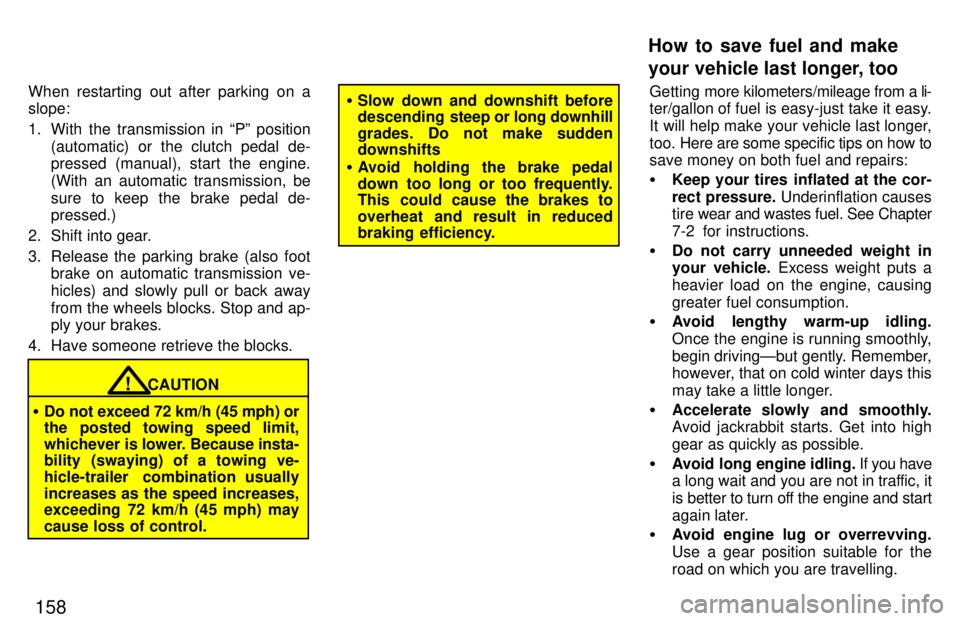
158
When restarting out after parking on a slope:
1. With the transmission in Pº position
(automatic) or the clutch pedal de-
pressed (manual), start the engine.
(With an automatic transmission, be
sure to keep the brake pedal de- pressed.)
2. Shift into gear.
3. Release the parking brake (also foot brake on automatic transmission ve- hicles) and slowly pull or back away
from the wheels blocks. Stop and ap- ply your brakes.
4. Have someone retrieve the blocks.
CAUTION!
� Do not exceed 72 km/h (45 mph) or
the posted towing speed limit,
whichever is lower. Because insta-
bility (swaying) of a towing ve-
hicle-trailer combination usually
increases as the speed increases,
exceeding 72 km/h (45 mph) may cause loss of control.
� Slow down and downshift before
descending steep or long downhill
grades. Do not make suddendownshifts
� Avoid holding the brake pedal
down too long or too frequently.
This could cause the brakes to
overheat and result in reduced
braking efficiency. Getting
more kilometers/mileage from a li-
ter/gallon of fuel is easy-just take it easy.
It will help make your vehicle last longer,
too. Here are some specific tips on how to
save money on both fuel and repairs: � Keep your tires inflated at the cor- rect pressure. Underinflation causes
tire wear and wastes fuel. See Chapter
7-2 for instructions.
� Do not carry unneeded weight in
your vehicle. Excess weight puts a
heavier load on the engine, causing greater fuel consumption.
� Avoid lengthy warm-up idling.
Once the engine is running smoothly,
begin drivingÐbut gently. Remember,
however, that on cold winter days this
may take a little longer.
� Accelerate slowly and smoothly.
Avoid jackrabbit starts. Get into high
gear as quickly as possible.
� Avoid long engine idling. If you have
a long wait and you are not in traffic, it
is better to turn off the engine and start
again later.
� Avoid engine lug or overrevving.
Use a gear position suitable for the
road on which you are travelling.
How to save fuel and make
your vehicle last longer, too
Page 156 of 223
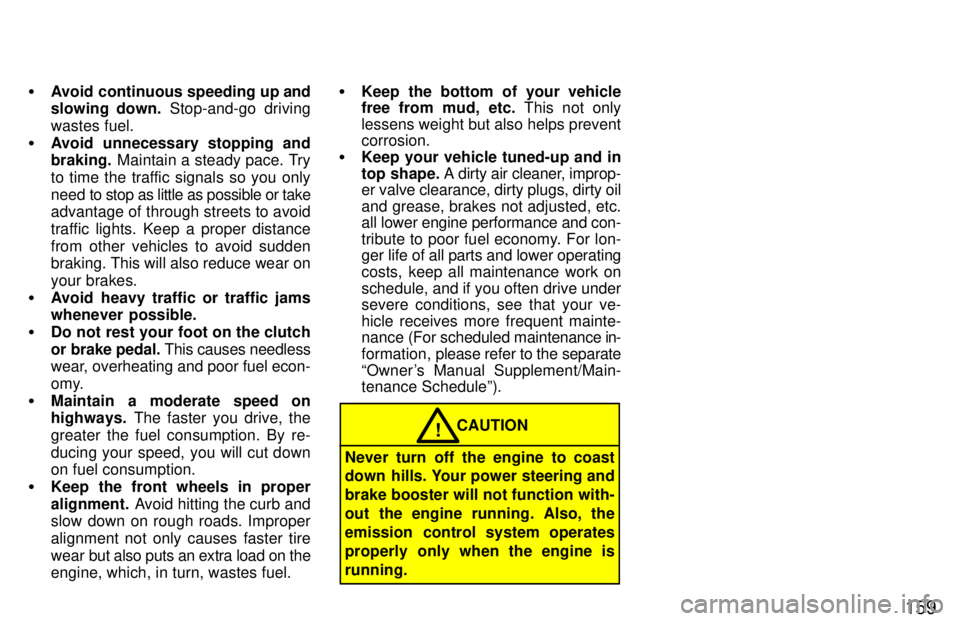
159
�
Avoid continuous speeding up and
slowing down. Stop-and-go driving
wastes fuel.
� Avoid unnecessary stopping andbraking. Maintain a steady pace. Try
to time the traffic signals so you only
need to stop as little as possible or take
advantage of through streets to avoid
traffic lights. Keep a proper distance
from other vehicles to avoid sudden braking. This will also reduce wear on your brakes.
� Avoid heavy traffic or traffic jams
whenever possible.
� Do not rest your foot on the clutch
or brake pedal. This causes needless
wear, overheating and poor fuel econ-
omy.
� Maintain a moderate speed on highways. The faster you drive, the
greater the fuel consumption. By re-
ducing your speed, you will cut down
on fuel consumption.
� Keep the front wheels in proper alignment. Avoid hitting the curb and
slow down on rough roads. Improper
alignment not only causes faster tire
wear but also puts an extra load on the
engine, which, in turn, wastes fuel. �
Keep the bottom of your vehicle
free from mud, etc. This not only
lessens weight but also helps preventcorrosion.
� Keep your vehicle tuned-up and in
top shape. A dirty air cleaner, improp-
er valve clearance, dirty plugs, dirty oil
and grease, brakes not adjusted, etc.
all lower engine performance and con-
tribute to poor fuel economy. For lon-
ger life of all parts and lower operating
costs, keep all maintenance work on
schedule, and if you often drive under severe conditions, see that your ve-
hicle receives more frequent mainte-
nance (For scheduled maintenance in-
formation, please refer to the separate
Owner 's Manual Supplement/Main-
tenance Scheduleº).
CAUTION!
Never turn off the engine to coast
down hills. Your power steering and brake booster will not function with-
out the engine running. Also, the
emission control system operates
properly only when the engine isrunning.
Page 158 of 223
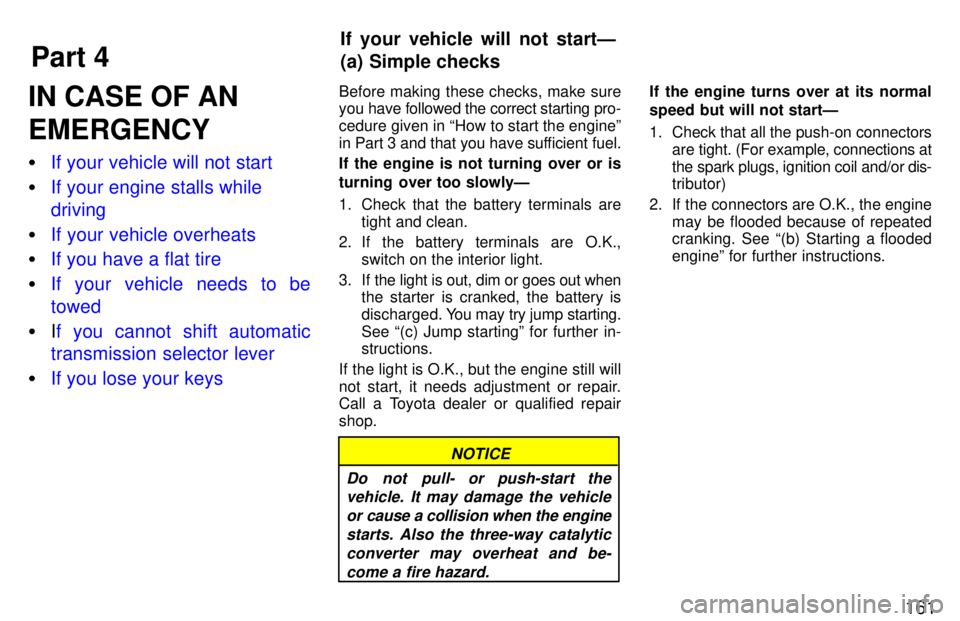
Part 4If your vehicle will not startÐ
(a) Simple checks
161
IN CASE OF AN EMERGENCY �
If your vehicle will not start
�If your engine stalls while driving
�If your vehicle overheats
�If you have a flat tire
�If your vehicle needs to be towed
�
If you cannot shift automatic
transmission selector lever
�If you lose your keys
Before making these checks, make sure
you have followed the correct starting pro-
cedure given in How to start the engineº
in Part 3 and that you have sufficient fuel.
If the engine is not turning over or is
turning over too slowlyÐ
1. Check that the battery terminals are tight and clean.
2. If the battery terminals are O.K., switch on the interior light.
3. If the light is out, dim or goes out when the starter is cranked, the battery is
discharged. You may try jump starting.
See (c) Jump startingº for further in- structions.
If the light is O.K., but the engine still will
not start, it needs adjustment or repair.
Call a Toyota dealer or qualified repair shop.
NOTICE
Do not pull- or push-start the vehicle. It may damage the vehicle
or cause a collision when the enginestarts. Also the three-way catalytic converter may overheat and be-come a fire hazard.
If the engine turns over at its normal
speed but will not startÐ
1. Check that all the push-on connectors are tight. (For example, connections at the spark plugs, ignition coil and/or dis-
tributor)
2. If the connectors are O.K., the engine may be flooded because of repeated
cranking. See (b) Starting a flooded
engineº for further instructions.